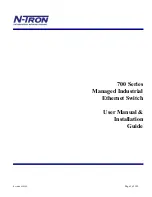
DRA-2 UNIVERSAL COMMUNICATION NODE
7/158
USER GUIDE - Rev.5 (January 2018)
The DRA-2 equipment is designed to transmit the services in a Transformation Centre to
higher levels in the electrical grid, through a wide range of interfaces:
Optical fibre
Medium Voltage Powerline Communications Technology (BPLC and SSPLC interfaces)
Cell technologies (GPRS/UMTS)
ADSL lines
Cable modem
The DRA-2 includes, as standard features, a serial maintenance interface, 6 Fast Ethernet
ports and 2 Gigabit Ethernet SFP bays.
The Fast Ethernet ports are usually used to provide service to the equipment in the
Transformation Centre (TC), such as PLC meter reading concentrators, remote telecontrol
units, protections, fault circuit indicators, cameras or IP phones.
The 2 Gigabit Ethernet SFP bays permit the inclusion of the DRA-2 communication node in
Optical Fibre ring-type topologies, or its use as a high-capacity uplink.
Clients should complete the equipment by selecting the different available interface options
(see section 1.3)
.
In addition to the switch function (L2), the DRA-2 has IPv4 route capacity (L3), which permits
various operation scenarios:
Option of operating as a switch for Ethernet, Gigabit Ethernet and PLC-MV (BPLC)
interfaces.
Routing functionality between two or more configured VLANs, with each VLAN being
made up of a set of local ports (Ethernet / Gigabit Ethernet / BPLC) and WAN interfaces
(GPRS / UMTS / ADSL).
The use of wireless WAN interfaces (GPRS / UMTS) as safety recourse (backup) for the
routing functionality described in the preceding section.
For the routing functions, the equipment supports the use of static (configured by the users)
and dynamic routing information, for which it has the standard RIP and OSPF routing
protocols.








































